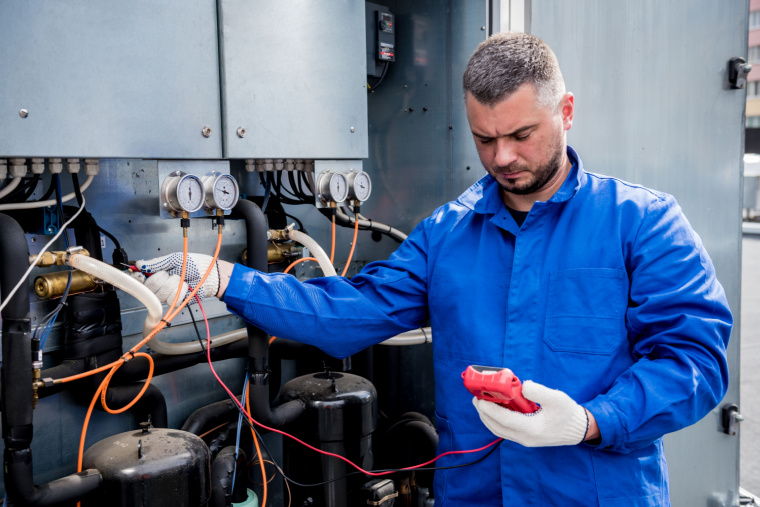Are you considering a rewarding career in the HVAC industry? With the growing demand for skilled HVAC technicians, now might be the right time to take the first steps.
However, the key to success may be in choosing the right "HVAC school near me" that will provide you with the necessary knowledge and hands-on skills. In this article, we will guide you through the essential factors to consider when selecting an HVAC school and help you understand the role of technicians, advancements in technology, and how to finance your HVAC education.

Take into consideration factors including accreditation, program offerings, and location when selecting an HVAC school. HVAC technicians play a crucial role in the installation, maintenance and repair of residential and commercial heating and cooling systems. Financing options include tuition costs, grants, scholarships or loans to help reduce the cost of pursuing an HVAC training.
HVAC School Near Me
Selecting an HVAC school is important for gaining a strong foundation for your potential future career as a heat and air conditioning technician. There are several factors to consider when evaluating HVAC schools, including accreditation, program offerings, and location.
The online HVAC schools below are generated automatically to be near your location.
If you see that the location and zip code that we have detected for you is wrong, please provide your correct zip code, and the relevant local HVAC Schools near you should automatically appear. There are schools in almost all large cities across the United States that offer online and/or on-campus HVAC certificate programs.
These schools offer courses such as operations, including applied safety and science concepts relevant to HVACR, setup and installation, electrical systems, heat pump operation and theory, and other courses relevant to air conditioning and heating systems.
Graduates of reputable programs should be qualified HVAC technicians. See licensing requirements of your state for particular licensing requirements (the licensing requirements can vary by state).
These schools may offer various tuition costs and financial aid options, depending on the program and the student's individual needs. For further information on tuition costs and financial aid options, it's advised to contact the schools.
Most online HVAC school options offer a comprehensive HVAC program. These schools are committed to academic excellence. Their online HVAC program options provide students with the knowledge and skills they need to succeed in the HVAC and HVACR industry.
In addition to providing a top-notch education, these online programs also often offer job placement assistance to help students find employment after graduation. By attending an online school, you can gain the necessary skills, knowledge, and support needed for a successful HVAC career from home.
Choosing an HVAC School
By weighing these factors, you can have assurance that you receive the best possible training, setting you up for success in the potentially lucrative HVAC industry.
Accreditation
Accreditation is a critical aspect of selecting an HVAC school. Accreditation guarantees that the school and their program options meet national standards, offer quality training, and prepare students for the workforce.
Furthermore, accreditation may impacts employment opportunities and the ability to secure financial aid. The accreditation process involves a comprehensive review of the school's curriculum, faculty, and facilities to grant accreditation, which shows adherence to the standards set by the accrediting body. Additionally, the school must demonstrate financial stability and a commitment to student success.
By choosing an accredited HVAC school, you can be confident in the quality of education you receive, as well as the school's commitment to your success. UEI College Sacramento is accredited by the Accrediting Commission of Career Schools and Colleges (ACCSC). This commission is known for providing quality educational standards and regulation. Attending an accredited institution will not only provide you with a solid education, but it will also enhance your employability and increase your chances of obtaining necessary certifications and licenses.
Programs
When evaluating HVAC schools, it is essential to consider the HVAC programs, as programs can vary in their focus. Some may concentrate on installation, maintenance, and repairing HVAC systems, while others may offer specialized programs in residential HVAC systems or commercial refrigeration, and other HVAC equipment.
HVAC schools typically provide a range of programs, including online, hybrid (online and on campus) programs, Associate of Applied Science (AAS) degrees, and certificates. The AAS degree, for example, may focus on the study of heating, ventilation, air conditioning, and refrigeration systems, as well as troubleshooting.
Choosing the right program is important in the HVAC industry. Find a program that aligns with your career needs.
For instance, many community colleges offer a Commercial Refrigeration Certificate or a similar certificate, which gives basic skills in HVAC/R, including brazing/soldering, copper tubing fabrication, and more.
The program might focus on the design, diagnosis, service, and repair of residential HVAC systems and hot-water heating systems. Reputable community colleges are accredited.
By selecting a program that caters to your specific goals, you can gain the knowledge and hands-on experience to excel in the HVAC field in the way that you want to work.
Location
Location plays a pivotal role in your decision to attend an HVAC school with refrigeration accreditation. Considering the geographical location of the school is important, as it can potentially influence job opportunities, and the quality of the program. Attending an HVAC school in close proximity to where you want to work offers practical training and experience close to where you can potentially find work. Furthermore, it presents a cost-effective and time-efficient option for commuting.
When assessing the commute to school, take into account the cost and time expenditure, as well as the safety and availability of public transportation. Additionally, consider the availability of housing, the cost of living, and the accessibility of other services, such as childcare. By taking these factors into account, you can better decide that your chosen HVAC school is not only vocationally suitable but also convenient for your personal needs.
The Role of HVAC Technicians

As an HVAC technician, your primary responsibilities will include the installation, maintenance, and repair of residential and commercial heating, ventilation, and air conditioning systems. With the demand for HVAC technicians projected to increase significantly over the next decade, pursuing a career in this field presents ample job opportunities, and the potential for self-employment - as 7% of technicians in the US are self-employed.
In the following sections, we will delve deeper into the specifics of residential HVAC systems and commercial refrigeration.
Residential Systems
Residential systems are designed to maintain a comfortable temperature, humidity, and air quality in residential buildings. These typically include a furnace or heat pump, air conditioner, ductwork, and thermostat. The most commonly used residential HVAC system is a split system, which employs separate components for heating and cooling and a traditional thermostat to regulate the temperature of the entire structure.
As an HVAC technician, you will be responsible for installing, maintaining, and repairing these residential HVAC systems. This includes working with furnaces, boilers, heat pumps, and air conditioners, as well as the associated ductwork and thermostats. Your expertise will ensure that homes remain comfortable and energy efficient throughout the year.
Commercial Refrigeration
Technicians also work with commercial refrigeration systems. These systems are used in various businesses, such as restaurants, grocery stores, and hotels, to regulate temperature and humidity and maintain their intended purpose.
Commercial refrigeration systems can be classified into two primary categories: mechanical and absorption. Mechanical systems rely on compressors to cool the air, whereas absorption systems employ a combination of water, ammonia, and other chemicals for cooling.
As an HVAC technician specializing in commercial refrigeration, you will work with refrigerators, freezers, cold rooms, refrigerated containers, exhibitors, chests, ice cube machines, and beverage chillers. Your expertise will ensure proper functioning and energy efficiency for businesses that rely on these systems to keep their products fresh and safe.
Advancements in HVAC Technology
Technological advancements have significantly improved the efficiency and user-friendliness of HVAC systems. From smart HVAC technology and geothermal systems to ductless systems and increased ventilation, these innovations have changed the way we heat and cool our homes and businesses.
In the following sections, we will explore two of the most notable advancements in HVAC technology: smart HVAC systems and energy efficiency.
Smart HVAC Systems
Smart HVAC technology is a cutting-edge innovation that enables the automation of HVAC systems. These intelligent systems can regulate temperature, humidity, and air quality while also tracking energy consumption. Smart technology can detect and diagnose issues with the system and provide notifications when maintenance is required.
The use of smart systems offers numerous benefits, such as increased control over the environment in a room or workspace, enabling users to customize the temperature, lighting, and fan speed to their exact specifications. Additionally, these systems are energy-efficient, eco-friendly, and cost-effective.
However, one of the primary disadvantages of smart systems is the associated cost, as installation and maintenance can be expensive, and additional hardware or software may be required for operation.
Energy Efficiency
Energy efficiency has become a top priority for many homeowners and businesses, as it not only helps reduce energy costs but also decreases the environmental impact. HVAC systems have evolved to become more energy efficient through the use of innovative equipment, proper installation, and regular maintenance. Examples of energy-efficient HVAC systems include geothermal systems, heat pumps, and variable-speed air conditioners.
By prioritizing energy efficiency in systems, homeowners and businesses can enjoy decreased energy costs, enhanced comfort, and better system dependability. Implementing energy-efficient means in systems can help contribute to environmental concerns and sustainability.
Preparing for a Career as an HVAC Technician
To embark on an HVAC career, it is essential to receive specialized training and obtain the necessary certifications.
In the next sections, we explain HVAC training programs and the importance of licensing and certification for technicians.
HVAC Training Programs

HVAC training programs provide students with the knowledge and hands-on experience required to become skilled HVAC technicians. These programs cover various topics, such as construction site operations, applied mathematics and science concepts relevant to HVACR, setup and installation, electrical systems, heat pump operation and theory, and specialty tools. Upon successful completion of an HVAC training program, students will be qualified technicians ready to enter the workforce.
When choosing an HVAC training program, it is crucial to select one that aligns with your career goals. For example, some programs may focus on residential HVAC systems, while others may concentrate on commercial refrigeration or other specialized areas. Additionally, consider the duration of the program, as some can be completed in less than a year, allowing you to start your career quickly.
Licensing and Certification
Licensing and certification are essential for HVAC technicians to ensure they possess the required knowledge and skills to perform their job safely and proficiently. While licensing is a legal requirement for technicians to practice in the industry, certification is not mandatory but allows you to demonstrate your accomplishments and be recognized as a qualified HVAC technician.
The process of obtaining a license and certification may vary depending on the state; however, it typically involves completing an HVAC training program, passing a licensing exam, and submitting an application to the relevant state licensing board.
By obtaining a license and certification, you can potentially get increased career and salary opportunities, as well as assurance that you have completed professional HVAC training.
Investing in your HVAC education can potentially be an important step towards a rewarding career. Tuition costs can vary widely depending on the school and program, ranging from $1,200 to $35,000. However, there are financial aid options available, such as grants, scholarships, and loans, to help cover these costs.
In the next sections, we will discuss tuition costs and financial aid options in more detail.
Tuition Costs
Tuition costs for HVAC schools can range from $1,200 to $15,000, depending on the type of program and location. Community college tuition can be between $4000 (for in-state tuition) to $15,000 (for out-of-state tuition).
Factors such as program duration and the type of degree or certification offered can also influence the overall cost of attending an HVAC school. When researching schools, it is essential to consider these factors to find a program that fits within your budget.
It is important to remember that investing in your education is an investment in your future career. While tuition costs can be substantial, the potential earnings as an HVAC technician can help offset these costs. Additionally, the demand for qualified HVAC technicians means that job opportunities are plentiful, ensuring a stable and rewarding career path.
Financial Aid Options
Many financial aid options are available to help cover the cost of attending HVAC schools. These options include federal grants, student loans, and specialized trade scholarships from retailers and trade organizations.
Grants are funds that do not need to be repaid and are usually awarded based on financial need. Scholarships are funds that do not require repayment and are generally awarded based on academic achievement or other criteria. Loans are sums of money that must be repaid with interest and are typically granted based on an individual's creditworthiness.
By exploring these financial aid options, you can pursue your HVAC education without the burden of excessive tuition costs. As you progress in your career, the potential earnings and job stability offered by the HVAC industry will help offset the initial investment in your education.
See our Financial Aid Guide for Online College Students.
Pursuing a career as an HVAC technician can be both personally and financially rewarding. By choosing the right HVAC school and program, you can ensure that you receive a quality education that prepares you for success in the field.
As you consider the trade school or community college, remember the importance of accreditation, program offerings, and location when selecting a school. Stay informed about advancements in HVAC technology and be prepared to invest in your education through tuition costs and available financial aid options.
With dedication and hard work, you can achieve an HVAC career and enjoy the benefits of job stability in this high-demand industry.
Frequently Asked Questions
Is HVAC from college worth it?
Completing a college degree in HVAC can be worth it in terms of long-term career prospects. With an associate's degree, technicians can look forward to potentially better job opportunities and higher salaries. The median annual salary is $48,630 per year, according to the Bureau of Labor Statistics.
Overall, an HVAC college degree appears to be a worthwhile investment for the future.
How long is HVAC school?
HVAC school typically takes 8 months of technical education, which includes hours of repairing, maintaining, and testing HVAC equipment. Online HVAC programs may be accelerated and take 6 months to complete.
Online and on campus program options are designed to give students the skills and knowledge they need to become certified technicians. With the right training, students can gain the skills necessary to work in the HVAC industry and find gainful employment.
How long does it take to learn the basics of HVAC?
It takes around 8 months to one year to learn the basics of HVAC/R, and certification programs can vary in length. The curricula cover a wide range of electricity, refrigeration, and mechanics that are essential for successful operation. If you're up for a challenge and have the commitment, then HVAC training could be the prudent choice. After completing a program, you should be better prepared to take the NATE certification exams.
How much is HVAC course?
The cost to get an HVAC license varies by state. In Florida the cost is $355 for the exam and $125 for the certification, or $100 to register/renew your license. Together, you can expect to pay anywhere from $455-$530 for all the required fees. Check with your state for specific fees.
More resources:
